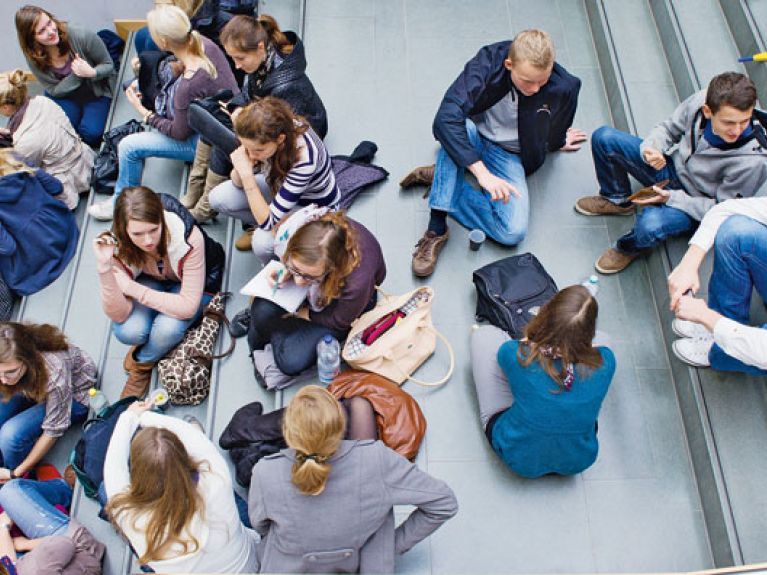“A plus in quality and opportunities”
What does the new EU programme Erasmus+ have to offer? An interview with Education Commissioner Androulla Vassiliou

Ms. Vassiliou, what does the “plus” in Erasmus+ stand for?
Erasmus+ goes beyond previous Erasmus programmes. Besides its basic focus on studying abroad, the major “plus” is that it integrates all areas of education as well as youth and sport sector programmes. With a budget of nearly 15 billion euros – 40% more than earlier programmes – Erasmus+ will improve the opportunities for four million people in Europe to gain experience in another European country – whether at university, in vocational training and the workplace or in voluntary services. The “plus” also means more quality and more measures, including closer collaboration between the education sector and the world of work through projects that encourage innovation and cooperation. There are plans, for example, to help 3,500 educational institutions and companies establish more than 300 Knowledge Alliances and Sector Skills Alliances to increase employability and entrepreneurship.
Is the programme open to more people than before?
Erasmus+ is aimed at people all over the world. It will enable students everywhere – including those from non-EU countries – to complete part of their studies in an EU country, and vice versa. Higher education institutions outside the EU are eligible for funding to help them build capacities, implement modernisation measures and establish international contacts. And for the first time, “plus” will also support sport. With a special budget of 265 million euros over the next seven years, the programme will allocate EU funds to transnational projects involving organisations in grassroots sport with a view to promoting good governance, gender equality, social inclusion, dual careers and physical activity for all.
The Erasmus programme is as popular as ever. Why change it at all?
The opportunities that Erasmus previously offered students will still be available, but they are being simplified, combined with other earlier programmes and extended to include new opportunities. Erasmus+ brings together seven existing EU programmes. The increased budget will enable more than 125,000 organisations and institutions to build partnerships within and between the different sectors covered by the programme in order to conduct joint projects to improve and internationalise teaching and learning in Europe. Various new initiatives, including a financial instrument providing favourable-term student loans, are designed to make it a lot easier for a much larger number of students to take their master’s degree in another country.
Erasmus is better known for enabling students to spend time abroad than for providing profound insights into academic and career opportunities in the host country. Are the changes also designed to enhance the quality of exchanges?
Erasmus+ will, more than ever before, address the issue of quality. For example, the Erasmus Charter for Higher Education specifies more precisely the responsibilities of the sending and receiving organisations before, during and after an exchange, not only in relation to content but also in terms of monitoring implementation. Adopting the same approach, the Vocational Education and Training Mobility Charter, which is to be introduced shortly on a voluntary basis, is intended to enhance the quality of exchange in this area and ensure that trainees are better prepared in terms of language skills, both before and during the exchange.
Youth unemployment is currently one of Europe’s major concerns. Can Erasmus+ be part of the solution? What other education projects is the EU conducting to address this problem?
To tackle the high rate of unemployment, the EU is promoting the quality of education and the value placed on it and facilitating exchange between member states. The EU is working together with the member states to set common objectives and monitor progress towards achieving these objectives. It is making sure that the importance of education policy is also reflected in the more comprehensive framing of social and economic policy as part of the Europe 2020 process. Individuals, educational institutions and other actors are also eligible for financial support, especially through Erasmus+. The EU promotes student and worker mobility in order to help these groups enhance their range of skills and experience. EU-funded projects offer educational institutions and other partners the opportunity to work together to improve specific aspects of education and training – ranging from the improved use of technology to “smart cooperation” between higher education institutions and employers.
Since the introduction of Bachelor and Master programmes, students at German universities have found the curricula very tightly packed. Why should they still take the time for a stay abroad?
Erasmus+ is not designed to prolong a student’s period of study by additional time spent abroad. On the contrary, while abroad students should be able to choose courses or complete internships they would otherwise do in their own country. That doesn’t mean that their activities abroad must match those at home one hundred per cent. Our aim is rather to encourage higher education institutions to be fair and flexible and facilitate exchange. Students and institutions throughout Europe have already realised that a stay abroad is a tremendous investment and a boon to studies. New skills and perspectives open up more opportunities to students. That’s why the necessary mobility windows have already been largely integrated into the curricula in Germany. ▪

